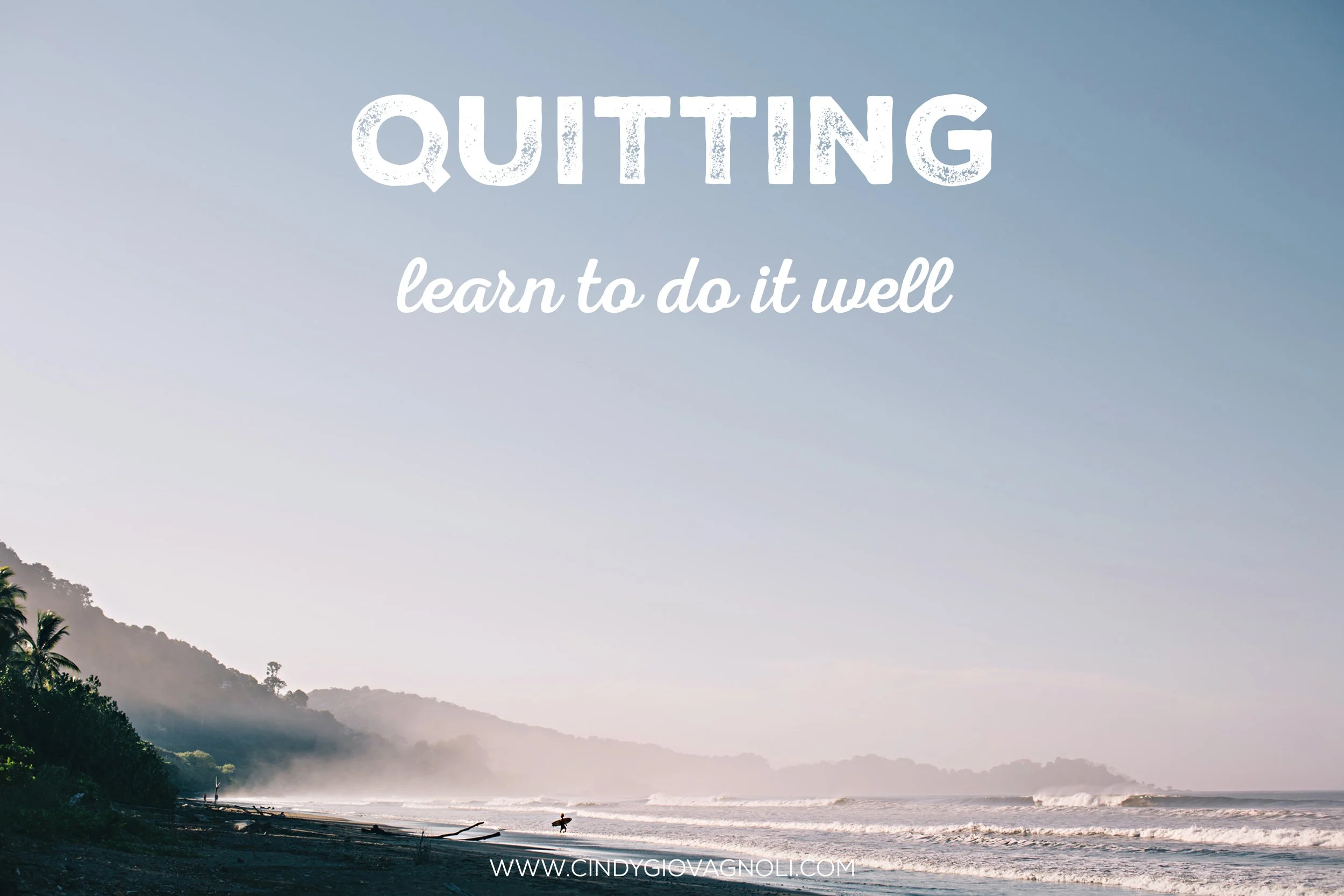Quitting
When I sent that note out a couple of weeks ago and mentioned that I was pausing the podcast indefinitely, I had no idea it would spur so many interesting conversations about what it means to "quit" something.
First, I do want to say thank you to everyone who reached out to offer support and praise for the podcast.
I always appreciate your kindness and enthusiasm. Truly. Thank you.
I also want to assure you that I'm absolutely okay with this pause, because here's the thing:
When we create things and put them out into the world, we do the best we can do and sometimes it works and also...sometimes it doesn't.
And that's okay.
My preference is to lean into curiosity and into a "both/and" mentality.
I can work hard, do my best, be proud of something I've created, AND understand that I have more learning to do, that my best doesn't mean it works, and that stepping back to evaluate where something fits into the bigger picture can also be part of the process.
We all have limited resources of various kinds.
Whether it's time or energy or money or some other thing, each and every day we have to make choices about what areas of our life or our attention get what.
This is always true.
ALWAYS.
There's just no getting around it.
We hear endless variations of calls to say no to things in service of those things that we most want to say yes to.
And that's a valid, important call.
What that means sometimes—a lot of the time, actually—is deciding what to quit and when to do it.
I don't know about you, but the message of "the only way to fail is to quit" is so deeply etched into my bones that the word "quit" is almost inextricably linked to failure for me.
It takes a deep pause and moment of honest reflection (and maybe some reframing) for me to think about quitting something without being consumed with feelings of failure and inadequacy.
As the kids (used to 😬) say: the struggle is real.
We can have a whole other conversation about the importance of failure (it's so, SO important to embrace!) but I'll table that for now.
But learning to quit and how to quit well is a skill worth cultivating.
There is a cost to not quitting something that isn't working.
Just ask my college boyfriend with whom I dragged out a relationship for a solid year knowing I didn't want to be there.
Damage was done, my friend, damage was done.
We've all done it.
We've all overstayed something at some point.
Stayed in a relationship or a job.
Kept playing the sport or the instrument.
Stolen time and energy from what's next because we were afraid or unwilling to let go of what we knew or because we didn't want to disappoint someone else.
The thing is, we almost always know when the right move is to quit versus persevere.
Many things are worth hanging on through the rough stretches or the dark hours before the dawn— I'm not saying that's not true.
But there is a difference, and somewhere deep, we almost always know it.
For me, one way to tell the difference is curiosity.
When I'm in a hard moment worth persevering through, I almost always naturally lean into curiosity.
I want to get at truth, at understanding, at what's underlying the difficulty and what parts of myself can rise to the occasion.
When I'm avoiding quitting something that has run its course, often the opposite happens.
I avoid questions I might not like the answer to.
I indulge in defensiveness or escapism or a victim mentality.
I hedge and negotiate with myself and hide in ways that feel out of my integrity.
And for those moments I'm not sure which is at play, I've come to trust that curiosity is the best "default" to choose.
I pause and give myself some space to pay attention and notice what's happening.
Sometimes that pause is mere moments, like when I'm out on a run and need to determine whether I really need to walk that hill or if I'm just letting myself off the hook because I'm uncomfortable, or I rub up against some resistance (or, as Stephen Pressfield might call it, Resistance...capitalized) when I start a creative project I'm excited but intimidated by.
Sometimes I need more time, like with this podcast, to really get a full picture of all the pieces at play, to consider all the angles, both internal and external.
Not everything is quittable, and some things have consequences to quitting that are so unacceptable to us that it renders them unquittable.
I get that.
But if we're being honest with ourselves, most things are quittable.
Again, there are consequences to every choice we make.
Consequences to quitting and consequences to staying.
Cultivate your curiosity here, your ability to distinguish the difference between selling yourself short and making intentional choices about where you spend your time and attention.
Pause.
Notice.
Get curious.
Make a choice.
And when it's clear that it's time to quit, do it with integrity.
Be honest.
Be clear.
Be timely.
Yank the band-aid off, so to speak.
Then move on.
There are other things waiting for you.
Have a great week,— get out there and practice quitting something, whether it's a project you don't feel connected to anymore, or the habit of speaking to yourself with harshness, or trying to get into those college jeans from 1999.
Let go and give yourself full permission to not look back.
There is plenty to look at in front of you, I promise.

